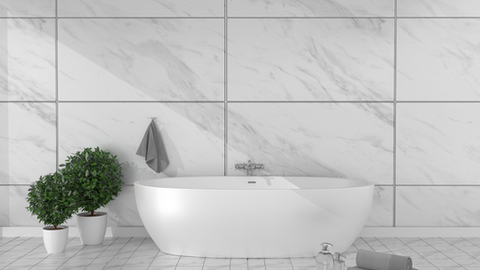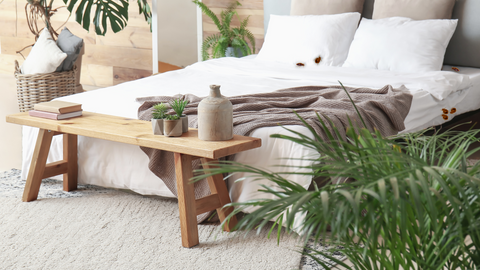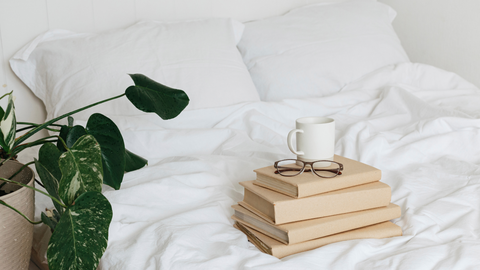PRIORITIZE YOUR WELL-BEING WITH NON-TOXIC CLEANING: THE BEST WAY TO CLEAN YOUR BATHTUB FOR A HEALTHIER SELF-CARE EXPERIENCE
Cleaning up stubborn soap scum and dirt can feel overwhelming, especially when you just want to decompress. The best way to clean a bathtub is a method that effortlessly restores its pristine condition, allowing you to fully embrace the serenity you deserve—without the added burden of a grimy tub.
After a long and tiring day, there's nothing quite like sinking into a warm bath to unwind and rejuvenate. Picture this: you've dimmed the lights, poured in your favorite essential oils, and set the stage for a tranquil retreat. But as you prepare to climb into the tub, your relaxation is abruptly shattered by the sight of a stray hair floating on the water's surface. It is a jarring reminder that your bathtub may not be as clean as you'd like. And, let's face it, soaking in toxic chemicals like bleach is far from comforting.
A big part of self-care is creating a sanctuary for your stress to melt away. Having a spotless bathtub is paramount. You want to ensure that every soak is a blissful experience, free from worries about hygiene and the use of harsh chemicals.
At Hygea Natural, we understand the importance of providing a clean and toxin-free environment for your well-deserved self-care rituals. In this guide, we will walk you through the most effective methods to achieve a spotlessly clean bathtub without compromising your health or the environment.
Join us as we delve into the best way to clean your bathtub, ensuring it's a welcoming space that nurtures your mind, body, and soul.
HOW TO CLEAN A BATH TUB IN 30 MINUTES: STEP BY STEP
- Gather your cleaning supplies: Before you begin, make sure you have all the necessary cleaning supplies. This includes gloves, a sponge or scrub brush, a cleaning solution, and a microfiber cloth or towel.
- Remove any items from the bathtub: Take any bath mats, toys, or other items out of your bathtub for clear access to all surfaces.
- Pre-treat stubborn stains and soap scum: Use a citrus-based cleaning solution for tough stains or built-up soap scum. You can also apply baking soda and water, letting it sit for a few minutes to loosen the grime.
- Apply the cleaning solution: Spray or apply a natural all-purpose cleaner to the bathtub surfaces. Ensure even coverage and pay extra attention to areas with stains or soap residue. Let the solution sit for a few minutes to work its magic.
- Scrub the surfaces: Take a sponge, scrub brush, or non-abrasive scrub pad and start scrubbing the bathtub surfaces. Focus on removing any dirt, grime, or stains. Use circular motions and apply some elbow grease to tackle stubborn spots.
- Pay attention to corners and crevices: Don't forget to clean the corners, edges, and hard-to-reach areas of the bathtub. These areas can accumulate dirt and require scrubbing.
- Rinse the bathtub: Once you've thoroughly cleaned the surfaces, rinse the bathtub with warm water. Make sure to remove all the cleaning solution and residue.
- Dry and shine: Use a clean microfiber cloth or towel to dry the bathtub surfaces. Performing this step helps prevent water spots and leaves a shiny finish.
- Clean the fixtures: Take a moment to wipe down and clean any fixtures, such as faucets, handles, and drains. Apply an appropriate cleaner to remove any mineral deposits or residue.
- Final inspection: Give your bathtub a final inspection to ensure it's sparkling clean. If needed, touch up any missed spots or stains.
HOW OFTEN SHOULD A BATHTUB BE CLEANED?
The best way to clean a bathtub is simply to keep it clean. How often a bathtub should be cleaned depends on several factors such as how well you maintain its cleanliness and how frequently you use it.Here are some general guidelines to help you establish a cleaning routine for your bathtub:
Daily maintenance: To prevent the buildup of soap scum, grime, and dirt, you should perform some simple daily maintenance. Rinse your tub with warm water and dry it with a towel or squeegee after each bath. You can also apply a natural grout cleaner to keep your bathtub and tiles fresh in between uses.Weekly cleaning: Use a natural cleaning spray to wipe down the surfaces of your tub once a week. Focus on removing any visible dirt, soap residue, or stains. Pay attention to the corners, edges, and fixtures.
Monthly deep cleaning: Even with regular weekly cleaning, deep cleaning of your bathtub once a month is the best way to ensure it stays pristine. A thorough cleaning session allows you to tackle any accumulated grime or hard-to-remove stains. Don't forget to clean the drains and address any mold or mildew growth.
WHY ARE NON-TOXIC CLEANING PRODUCTS THE BEST WAY TO CLEAN A BATH TUB?
Non-toxic cleaning products are formulated without harsh chemicals and toxins that can be harmful to your health. Traditional cleaning agents often contain ingredients like bleach or ammonia, which can release fumes and irritate the respiratory system, leading to discomfort or allergic reactions. By opting for non-toxic alternatives, you can create a healthier environment for both yourself and your loved ones.When you clean your bathtub with non-toxic products, you minimize your exposure to chemicals that could potentially be absorbed through your skin or inhaled while you relax in the tub. This is particularly important during self-care moments when you want to create a soothing and safe environment. They also tend to have gentle fragrances that offer a more refreshing experience than their chemical counterparts.
Non-toxic cleaning products are typically eco-friendly and biodegradable. While many DIY natural cleaning products can be ineffective, non-toxic/all natural cleaning products offer the effectiveness of conventional cleaners with the safety of naturally derived formulas.
The best way to clean a bathtub should provide you with powerful results and peace of mind. By incorporating non-toxic cleaning supplies into your routine, you actively promote wellness, prioritize self-care, and contribute to a healthier and more sustainable environment for yourself and future generations.




